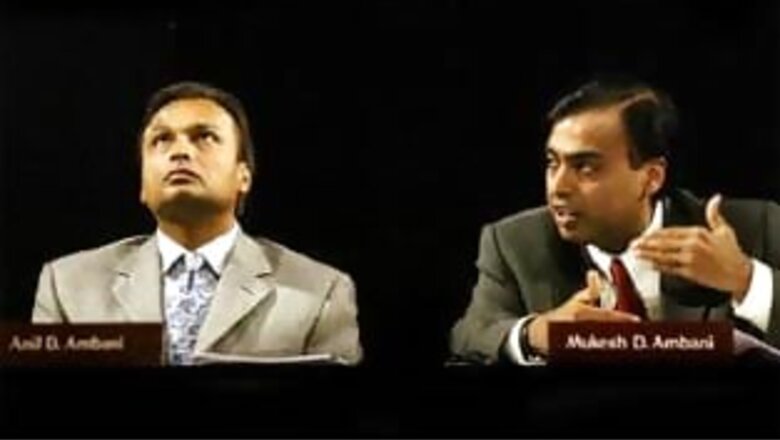
views
Mumbai: India's billionaire Ambani brothers face off in the country's top court this week over a gas pricing case with all guns blazing: lined on each side are a battery of India's highest paid legal brains.
The Supreme Court will on Tuesday start hearing arguments in the case between Reliance Industries, headed by Mukesh Ambani, and Reliance Natural Resources, led by Anil Ambani, over a deal to sell gas to RNRL at below-market rates as per a family settlement.
This is not the first time the brothers, sons of legendary businessman Dhirubhai Ambani, have fought over business interests that span oil and gas, retail, telecoms, entertainment, financial services and infrastructure since a 2005 settlement brokered by their mother Kokilaben.
Two years ago, talks between Anil's Reliance Communications and South Africa's MTN Group to create a top-10 global telecoms firm were scuppered by Mukesh's claim to a right of first refusal on the Indian mobile firm's shares.
The brothers played joint hosts at a recent 75th birthday party for their mother, raising hopes they may bury the hatchet. Top Government officials and a lower court have suggested they go back to their mother to resolve the gas dispute.
But the row over gas pricing, which analysts say highlights India's uncertain regulatory environment, has prompted a near-daily barrage of words, including an outburst by Anil at a shareholders' meeting, and newspaper advertisements accusing the petroleum ministry of favouring Reliance Industries.
Anil has unexpectedly offered to reconcile with Mukesh and resolve their differences, but Reliance Industries has argued the row goes beyond a mere family squabble.
Analysts say the court must also take a broader view of the Ambani settlement of 2005, which was never made public.
"Who knows what else is in there? This kind of fighting is very damaging to shareholders; they have a right to know the risks," said Arun Kejriwal, director at research firm KRIS.
WHAT'S AT STAKE?
The gas, which Reliance Natural wants at almost half the Government-set rate of $4.2 per million metric British thermal unit (mmBtu), comes from the vast Krishna Godavari basin off India's east coast that is operated by Reliance Industries.
The field is the country's biggest gas find and is expected to nearly double India's gas output when production is at full throttle at 80 mmscmd.
Energy-hungry India, which wants to reduce its dependence on foreign oil and become a new frontier for oil and gas exploration, has showcased the discovery in the KG basin to attract foreign investors.
But analysts worry the Ambani dispute is putting off foreign investors, with possible Government interference in the pricing and marketing of gas raising investment risk in a politically sensitive resource.
Next Page: How is the Government Involved?
PAGE_BREAK
HOW IS THE GOVERNMENT INVOLVED?
The Government initially filed a petition in the Supreme Court asking to be made a party in the dispute, arguing the family agreement between the brothers was not applicable, and Reliance Industries could only sell gas with its consent.
The Government later modified its stance, saying it only wanted to assert that it is the rightful owner of the gas.
The Government also said its policy on pricing and marketing of gas did not apply to pre-existing contracts such as one between Reliance Industries and state utility NTPC Ltd, a point which may be used by Reliance Natural to strengthen its case.
Anil Ambani has said the petroleum ministry's efforts to control the pricing and sale of gas was the reason for the poor response to the Government's global auction of oil and gas exploration blocks this week.
HOW IS THE LAW INVOLVED?
The Supreme Court will hear the case between the brothers on Oct. 20. In a brief hearing on July 20, it did not exclude the Government from the case.
The Ambanis have appealed a decision by the Bombay High Court -- a lower legal authority -- which directed the brothers to reach a suitable agreement over gas supplies.
Anil wants the Supreme Court to direct Reliance Industries to supply his company with the gas on the earlier-agreed terms, while Reliance Industries argues the private agreement signed by Mukesh is not binding on the company.
A verdict is not expected on Oct. 20, and the case could stretch for weeks, months or even years, analysts have said. The chief justice of India, K.G. Balakrishnan, along with two other judges, will hear the case.
THE IMPACT ON SHARE PRICES?
Analysts see Reliance Industries, which has a market value of $74 billion, gaining about 6 percent if the court rules in its favour, while the stock may fall 5 percent on an unfavourable ruling. The stock has risen about 77 percent so far this year, in line with the main index.
Reliance Natural shares could soar 40 percent if the ruling goes in its favour, and could slide 13 percent or more if the verdict is against the company, market watchers said.
Next Page: Sliding Fortunes
PAGE_BREAK
SLIDING FORTUNES
Mukesh, 52, a chemical engineer by training, dropped out of an MBA from Stanford University where he was a classmate of Microsoft CEO Steve Ballmer, and joined Reliance in 1981.
He is credited with spearheading the textile major's foray into petrochemicals, refining, and oil and gas exploration and production.
Earlier this year, Mukesh commissioned a new 580,000 barrel per day (bpd) refinery, next to Reliance Industries' 660,000 bpd facility in Gujarat, making the complex the world's single-largest for refining.
Mukesh also created Reliance Infocomm, known now as Reliance Communications, the company Anil heads, and swept into retail. Reliance Retail has a joint venture with Marks & Spencer.
Anil, who has a business degree from Wharton, established the Anil Dhirubhai Ambani Group which has interests in power, financial services, infrastructure and entertainment.
Married to a former Bollywood actress, Anil's Reliance Entertainment recently put $325 million in Steven Spielberg's DreamWorks movie studio and has signed on actors including George Clooney, Jim Carrey and Julia Roberts to co-produce films.
A teetotaller and a deeply religious Hindu, Anil often visits temples before the start of new ventures, and has made the rounds of holy shrines recently, ahead of next week's hearings.
Articulate and a sharp dresser, Anil was named an MTV Youth Icon and was briefly an independent member in the Upper House of Parliament. He resigned in March 2006.
Dubbed "Marathon Man" because he runs every morning and is a regular in the annual Mumbai run, Anil was the biggest loser on the Forbes list this year, falling to No.34, with $10.1 billion, a mere quarter of his 2008 worth.
Mukesh, who has splashed out $1 billion on a new 27-storey home, a luxury jet for his wife with showers and a bar, and a $100 million cricket franchise in Mumbai that includes star batsman Sachin Tendulkar, ranked 7th globally with $19.5 billion.
Mukesh, who declared a surprise 1-for-1 bonus share issue for Reliance Industries last week, on Thursday said he would take a two-thirds pay cut, days after comments by the prime minister and other officials on "vulgar salaries".
But the brothers' attempts to win public support may fail.
"I think people are a little tired, they have lost patience and some faith in them," said Kejriwal.




















Comments
0 comment